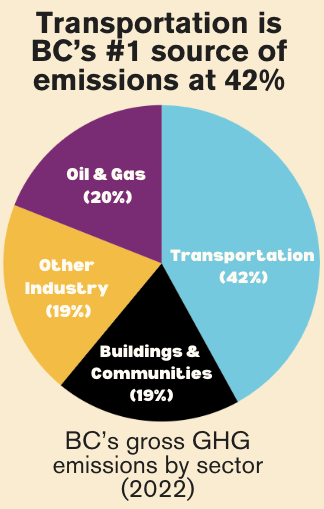
What Is CleanBC?
CleanBC is British Columbia’s flagship climate action plan, designed to cut greenhouse gas emissions through clean energy, efficient buildings, and low-carbon transportation. Launched in 2018, the program aims to reduce emissions by 40% below 2007 levels by 2030. However, the province’s 2024 accountability report reveals our climate plan is missing its targets, especially in the transportation sector.
Our Take
While we applaud the provincial government’s commitment to climate action through CleanBC, its overemphasis on electric vehicles (EVs) is failing to deliver the emissions reductions we urgently need. EVs may reduce tailpipe emissions, but they fail to address the root causes of our transportation crisis:
- They don’t reduce congestion (an EV takes up the same space as a gas car)
- They encourage sprawl by perpetuating car-dependent development
- They’re unaffordable for many British Columbians
- They’re less safe than transit (transit is 10 times safer per kilometer traveled)
Yet while BC’s population grew 7% faster than the national average, transit service levels stagnated. This isn’t just inconvenient, it’s actively undermining our climate goals. Research shows that choosing transit over driving reduces light-duty vehicle emissions by 80%, it’s one of our most effective emission reduction strategies.
There is significant latent demand for transit in BC. In Surrey and Abbotsford, places once dominated by cars now see overwhelming transit demand. BC Transit’s Route 66 runs consistently overcrowded, and Surrey’s improved bus corridors saw 20% ridership growth in 2024 alone, adding 4 million annual boardings from just 6 routes. This surge came from basic improvements like increased bus frequency and transit priority measures, proving that when you invest in transit, people will use it.
Our Recommendations for CleanBC
We call on the province to:
1) Shift focus from EV Incentives to Transit Expansion: By encouraging more drivers on the road, EV incentives worsen congestion, slow goods movement, and force heavy-duty vehicles to idle on highways longer. Expanding transit networks will provide reliable, recession-proof transportation for B.C.’s growing population while reducing carbon emissions, household expenses, and traffic congestion.
2) Expand Public Transit
- Build the UBC SkyTrain & SFU Gondola: The SkyTrain to UBC and Gondola to SFU are population-proof, near-zero-emission systems with stable operational costs that scale with demand and allow commuters to completely bypass road congestion in high-growth areas. They would prevent 327,470 kg of daily emissions and serve over 163,000 daily riders by 2030.
- Launch a Provincial Bus Network: We could connect rural communities stranded since Greyhound’s collapse, reduce dangerous highway travel, and cut intercity car trips that EVs won’t address. Saskatchewan’s provincial intercity bus system only cost $17 million annually.

3) Support Bus Priority Infrastructure: Implementing bus priority infrastructure on highways and urban corridors would simultaneously boost transit ridership, reduce CO2 emissions, and enhance economic productivity.
- Bus Lanes: Dedicated bus lanes in high-density urban areas and shoulder bus lanes on highways both provide cost-effective ways to cut emissions and speed up buses.
- Automated Bus Lane Enforcement: Automated camera enforcement could generate over $20 million annually for Metro Vancouver. Currently, British Columbia does not allow transit agencies to employ automated bus lane enforcement, but this can be remedied with a small tweak to the Motor Vehicle Act.
- Transit Signal Priority: Transit Signal Priority (TSP) cuts bus delays and emissions by prioritizing buses at traffic lights, reducing intersection delays by 80% and travel times by 18%. B.C. already saw the benefits of TSP with Vancouver achieving a 40% reduction in time variability on the 98 B-Line when it was in operation in the 2000s.
Click here to read our full CleanBC review.
Add Your Voice
Transportation is British Columbia’s largest and fastest-growing source of emissions but it’s also where we can achieve the greatest gains for climate action, affordability, and community well-being. With one million weekly transit riders in Metro Vancouver and growing demand across the province, the case for transit expansion has never been clearer.
Every day we delay transit expansion:
- Emissions keep rising
- Families get squeezed by car costs
- Our roads stay unsafe
CleanBC must stop subsidizing the status quo and start building the transit system our climate and communities need.
The solutions are here. The benefits are proven. What we need now is political courage.
Join us in calling on the provincial government to make transit a priority of CleanBC.
The provincial government is seeking public input on CleanBC’s policies, and we need transit advocates to speak up!
Copy & paste these key points in your submission:
- Shift focus from EV subsidies to high-return transit projects
- Fast-track the UBC SkyTrain and SFU Gondola
- Create a province-wide intercity bus network
- Invest in bus priority lanes and signal infrastructure
Let’s show the government that British Columbians want real climate solutions: affordable, efficient transit that cuts emissions now.
Complete the CleanBC survey by August 1, 2025 at 4 pm.